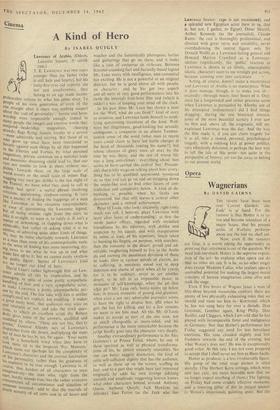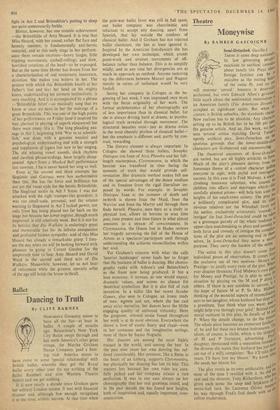Opera
Wagnerians
By DAVID CAIRNS
THE ravens have been seen over Covent Garden; 'this Ende" is at hand. For the 'rumour is that Hotter is to re- tire and become intendant of a major house, that his present series of Walkiire perform- ances are the last we shall see.
Now, even if the rumours are false, it is worth taking the opportunity to point out that retirement is out of the question. We need him too much. Hotter is the supreme expres- sion Of the ari—he explains what opera can do that no other art can. It is he, as no other singer does except Madame Callas, who realises opera's unrivalled potential for making the largest moral concepts of human imagination come alive and stalk the stage.
Even if five hours of Wagner -taxes a man of fifty-three beyond reasonable comfort, there are plenty of less physically exhausting roles that we should and must see him In—Ktirwenal, which he has not sung here for over a decade, Don Giovanni, Gunther again, King Philip, Don Basilic), and Claggart, which I am told that he has played with incomparable force and malignance in, Germany. Not that Hotter's performance last Friday suggested any need for less herculean exertions. His tone clouded slightly and lost freshness towards the end of the evening, but what Wotan 's does not? He was in exceptionally good voice. At this rate, I am not even prepared to accept that I shall never see him as Hans Sachs.
Hotter as Producer is a less invulnerable figure. His grasp of the total stage picture is often sketchy. (The Herbert Kern settings, which were new last year, are more bearable now that we no longer expect anything of them.) The lighting on Friday had some crudely effective moments, and a towering pillar of fire in instant answer to Wotan's imperiously pointing spear. But the fight in Act 2 and Briinnhilde's putting to sleep are quite unnecessarily feeble.
Hotter, however, has one notable achievement —the Briinnhilde of Amy Shuard. It is true that Miss Shuard, with her round, rather flat face and homely manner, is fundamentally anti-heroic material, and at this early stage in her perform- ance there remain excesses—heavy lunges, little tripping movements, eyeball-rollings, and slow, horrified rotations of the head—to be expunged. But at the same time Hotter has drawn from her .a characterisation of real tenderness, innocence, devotion. She makes you believe in her. The gesture with which this Briinnhilde kneels at her father's feet and lay her head on his mighty knees, understanding his torment instinctively, is very touching. And it is accompanied by a phrase bittet'—so musically sung that we know at once we have in her the makings of a great Briinnhilde. This was one of the high points of her performance on Friday (and it inspired the bas.: clarinet to playing of superb eloquence) but there were many like it. The long pleading pas- sage in Act 3, beginning with War es so schmith- lich,' was done with a genuine musical and psychological understanding and with a strength and suppleness of legato line new to her singing. ThL. old whining vowel sounds, slack rhythms and careless phrase-er.dings, have largely disap- peared. Apart from a Alasked Ball performance last summer, I have never heard her sing so well.
Even at the second and third attempts her Sieglinde and Gutrunc were less authoritative than this. She has the force and brilliance but not yet the vocal style for the heroic Brtinnhilde. The Siegfried motiv in Act 3 Scene I was not attacked with the right trumpet-like grandeur; it was too small-scale, personal; and the solemn warning to Siegmund in Act 2 lacked power, not only from her being placed too far back on the stage but because her lower register, though much improved is still relatively weak. But it is not for its heroics that Die Walkiire is enduringly great and memorable but for its infinite compassion and profound human sympathy; and of this Miss Shuard has already a remarkable grasp. I fore- see the day when we will be looking forward with pleasure to going to Covent Garden for the umpteenth time to hear Amy Shuard and David Ward in the second and third acts of Die Walkiire. Meanwhile, however, let us not hear of retirement while the greatest operatic artist of the age still holds the house in thrall.



































 Previous page
Previous page